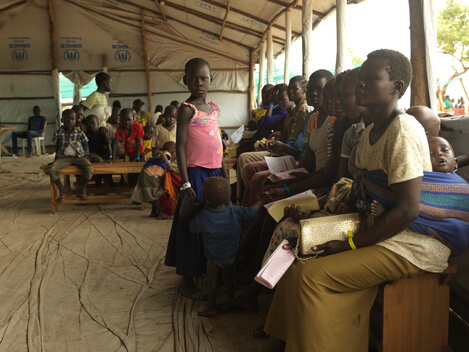The number of refugees crossing into Uganda from conflict stricken South Sudan has exceeded one million according to a statement released by United Nations High Commission for Refugees (UNHCR) on Thursday. Only two months ago, the number was estimated to be at 800,000 but continued insecurity along with the humanitarian crisis in South Sudan has caused people to flee for safety in Uganda.
The UN refugee agency reports that an average of 1,800 South Sudanese refugees have been arriving in the country escaping the civil war over the past 12 months. This number now brings the total refugee population in Uganda close to 2 and a half million including those from Rwanda, Burundi, DRC and Somalia.
Uganda hosts the biggest number of refugees in Africa and with the surge in South Sudanese refugees, UNHCR has reiterated its call to the international community for urgent additional support for the refugee situation which has exerted immense pressure on host communities in Northern Uganda.
“In Uganda, more than 85 per cent of the refugees who have arrived are women and children (below 18 years in age),” Charlie Yaxley, the UNHCR Spokesperson in Uganda said in the statement released Thursday.
The UN refugee agency says that recent arrivals speak to persistent barbaric violence in Africa’s youngest nation, with armed groups reportedly burning down houses with civilians inside, people being killed in front of family members, sexual assault of women and girls, and kidnapping of boys for forced conscription.
“With refugees still arriving in their thousands, the amount of aid we are able to deliver is increasingly falling short. For Uganda, US $ 674 million is needed for South Sudanese refugees this year, but so far only a fifth of this amount (21%) has been received,” Yaxley, said.
“Elsewhere in the region, the picture is only marginally better – in all US$ 883.5 million is needed for the South Sudan situation, but only US$ 250 million has been received,” the statement adds.
The funding shortfall in Uganda is now significantly impacting the abilities to deliver life-saving aid and key basic services. In June, the World Food Programme was forced to cut food rations for refugees.
Social services including education, water and health have felt an even bigger pinch with infrastructure like schools and health centres within host communities in northern Uganda overwhelmed by the huge refugee numbers.
Having witnessed first hand the magnitude of need in his recent visit to Imvepi refugee settlement in Arua district on June 22, the UN Secretary General Antonio Gueterres urged for more support from the international community to Uganda.
But more importantly, Gueterres called on the parties involved in the South Sudanese conflict to resolve it immediately saying; “Peace in South Sudan is a must. It’s time for the war to end. It’s time for the leaders in South Sudan to understand that they need to stop this war.”
Commenting on UNHCR’s announcement, Keith Muhakanizi the Permanent Secretary in the Ministry of Finance and Secretary to the Treasury said on Thursday that; “The impact on the hosting districts is sharp. Where you had 70 people going to a health centre, now you have 1,000. Where you had 600 students in a school, now they are in thousands. The social facilities are under immense stress.”
“In the short run, government and the development partners need to invest more in the host communities,” Muhakanizi said.
In 2013, fighting broke out in South Sudan’s capital Juba with forces loyal to sacked deputy President Riek Machar battling with President Salvar Kiir leaving tens of thousands killed. A third of the 12 million population have since fled their homes while 2 million people have fled to neighboring countries.








